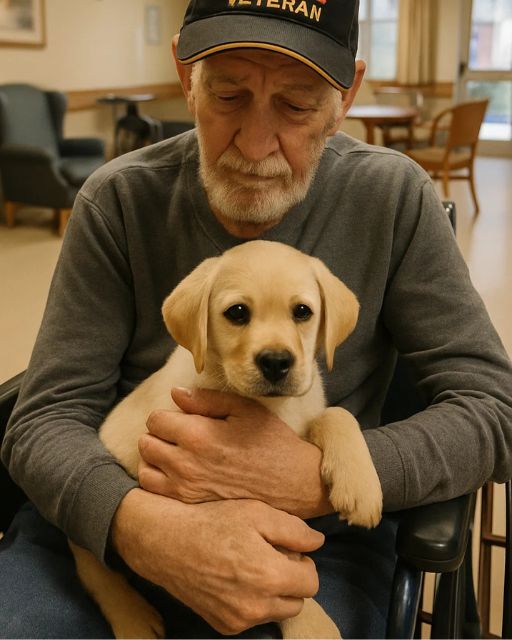No one really knew his story.
Harold arrived at the nursing home with only a duffel bag, a duct-taped photo album, and a “Vietnam Veteran” cap he never removed. He spoke little, ate in silence, slept by the window. No visitors. No mail.
His silence wasn’t peaceful—it felt haunted.
Then one Wednesday, a therapy puppy climbed into his lap. He didn’t flinch or smile, just rested his hands on her like it was familiar. Then, he whispered:
“Where did you find her?”
The nurse was confused.
“That mark on her paw,” he said. “Same as Molly’s.”
Everyone looked. There it was—a tiny smudge above her paw.
“She’s her,” he murmured. “We lost each other in the crash. She had that same mark.”
His name was Harold, known as “the quiet man.” But after that moment, things changed. He began to share his story bit by bit.
Harold had been drafted after high school. Before leaving, he adopted Molly, a shelter dog. They were inseparable until the war. When he returned, a car accident killed his parents, and Molly disappeared. He searched, but never found her. Heartbroken, he drifted for decades, alone, until ending up in the nursing home.
Now, with the puppy in his lap, Harold came alive again. He told stories, joined activities, even laughed. Some doubted the dog was Molly reincarnated. Others believed. What mattered was the bond—they both began to heal.
Then came a surprise: a woman named Clara said the puppy, named Sasha, had been found near Maple Ridge—where Harold’s accident happened.
“That’s where we lost her,” he said, eyes wide. “She came back.”
Sasha became his permanent companion. The nursing home noticed the change not only in Harold, but in others too. Residents opened up. The place felt warmer, more alive.
Before he passed peacefully a year later, Harold asked that Sasha stay to comfort others. She still roams the halls, bringing light—just like she did for him.
